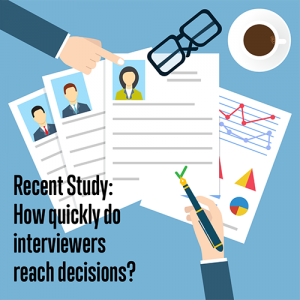Val Matta is the VP Business Development, CareerShift, LLC. She’s both a networker and blogger whose daily mission is to help job seekers find employment more easily and conveniently. In 2009, the company received the “Career Innovator Award” by Career Directors International, and in May they were spotlighted in a Forbes article, Job Search: 3 Online Tools To Stay On Track.
Because iontuition has the shared goal of supporting successful student placement in jobs that train, promote, and advance career development, we became aware of a new study published in the Journal of Occupational and Organizational Psychology in April. The study reveals how interviewers make decisions about the candidates they interview. Val wrote about the study in the context of a blog post, 3 Little Things That Make A Big Difference In Your Interview. Her article caught our attention and we were able to track Val down (she picked up her phone on the second ring!) to bring you her wisdom, and some practical tips, on the subject of job interviews.
What was it about the study that stood out to you?
The study, published in the Journal of Occupational and Organizational Psychology in April, notes three not-so-obvious factors in a job interview that could give job seekers a competitive advantage or disadvantage in being the employer’s chosen candidate.
How can our readers leverage this “not-so-obvious” information to their advantage for an impressive interview?
If you focus on these three points, and take them seriously, they’ll help you enormously:
-
(1) Time of interview
One of the study’s findings implied the order of your interview could place you at a disadvantage. For instance, if your interview is scheduled later, either later in day or if you’re one of the last candidates the employer is seeing altogether, interviewers might not be as engaged as you present who you are and what you have to offer. If given the option, schedule your interview early in the week and in the morning. This way, when you meet with the interviewer, you’re both fresh and alert.
If a later interview is unavoidable, prepare compelling, yet short answers to common topics covered in the interview like, “Tell me about yourself,” and rehearse speaking them aloud. If you have portfolio pieces, create a short engaging visual presentation to show the interviewer, disrupting the humdrum Q&A of the typical interview they’ve seen so far.
-
(2) Rapport building
While skills, experience, and overall presentation will get you far, there’s another factor that could serve as the tie-breaker between you and other talented candidates: how well you get along with the interviewer. The study found candidates who built rapport with interviewers were more likely to get hired. It’s not hard to see why — employers want to hire employees they feel they’ll get along with and who will integrate well into the company’s culture.
One of the best job interview tips is to research not only the company, but the people who work there. Look at the background of your new potential co-workers and manager on LinkedIn. Read bios on the company’s website, find out their favorite hobby, food, or interests. Practice conversation starters that will help you build rapport with the interviewer and any employees you meet during the interview.
-
(3) The interviewer’s busy schedule
Chances are, the manager you’re interviewing with is going to be busy. Just how busy could determine the fate of your interview. In the study, some interviewers reported making quick decisions about certain applicants based on only minimal information. This may have been due to scheduling too many interviews in one day or trying to squeeze interviews onto an already-full plate. Decisions under these circumstances were found to be more likely unreliable and inaccurate. You have no control over the hiring manager’s busy schedule, but there are ways to help the interview process be as efficient as possible:
- Research the preferred experience and qualifications associated with the position before the interview.
- Make an organized list of talking points that can help you keep the interview focused on the information most relevant to what you, as an employee, can bring to the company. Learning this information upfront will help the interviewer make clearer decisions about who to hire.
It’s all good information! Can you give us a recap?
Yes, take your time preparing. Applying these job interview tips will help you prepare for a smooth interview process, regardless of the circumstances. Not only will it help the interviewer make more informed decisions, but it will save precious time on a crammed day. The interviewer will thank you for your consideration — maybe with a job offer.
Val Matta is the vice president of business development at CareerShift, an online job hunting and career management solution that gives job seekers control over their job search. It’s available for individual users, university and military career services centers, libraries, and corporations seeking to offer outplacement assistance to former employees. Connect with Val and CareerShift on LinkedIn.


